Edie Melson's Blog, page 202
April 27, 2020
Dipping the Quill Deeper: The Writer & The Sword
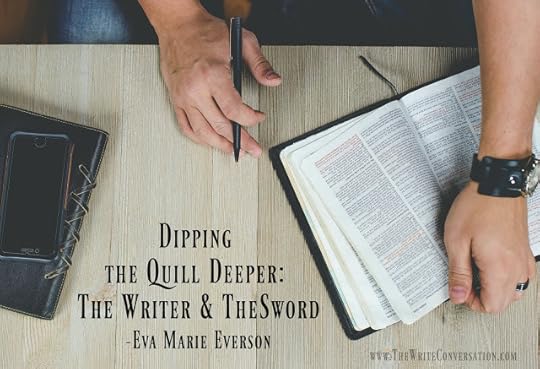
by Eva Marie Everson @EvaMarieEverson
One of my favorite biblical characters is a man named Nehemiah. Nehemiah served the Persian king Artaxerxes I of Persia, a man who reigned over his kingdom from 465-424 BC. Nehemiah’s occupation was that of “cup bearer,” a job that required the utmost trust of the king. When Nehemiah’s brother from Jerusalem came to visit him in Susa, Nehemiah quickly asked about the Jewish remnant who had survived the exile and about the condition of their beloved “home,” Jerusalem. “Those who survived the exile and are back in the province are in great trouble in disgrace,” they told him.
Worse, the wall of Jerusalem was in shambles. The gates leading into the city had been burned with fire.
The news rocked Nehemiah … and he cried. In fact, he wept and fasted and agonized to the point that when it was his time to go to the king, Artaxerxes noticed that Nehemiah was not the same man as usual. After inquiring as to the problem, the king gave Nehemiah permission to return to Jerusalem but asked, “How long will you be gone?”
Nehemiah set a time, although the Bible doesn’t give what that time was, but does say that the king was pleased with it. As a writer, I think of it much like a “due date” on a contract.
Accessing the Situation & Getting to WorkOnce Nehemiah arrived in Jerusalem, he quietly accessed the situation then rounded up men to help rebuild Jerusalem’s wall. Naturally, as soon as they got started, the naysayers put in their two cents. (Ever have that happen to you, writer? Have you ever started the “good work” God has commissioned you to perform only to have those around you pooh-pooh it?)
Nehemiah declared, “The God of heaven will give us success. We his servants will start rebuilding, but as for you, you have no share in Jerusalem or any claim or historic right to it” (Nehemiah 2:20).
The critics left the men to do their work.
But, oh, if the story ended there …
As soon as these same men heard that the builders were accomplishing their task, they returned, this time full of ridicule. But while they plotted to cause trouble, Nehemiah continued to pray, asking God for His protection. Soon enough, even the laborers were moaning and complaining.
But things really turned nasty when the death threats started (Nehemiah 4:11).
A Brick in One Hand, A Sword in the OtherFrom that day on, half of my men did the work, while the other half were equipped with spears, shields, bows and armor. The officers posted themselves behind all the people of Judah who were building the wall. Those who carried materials did their work with one hand and held a weapon in the other, and each of the builders wore his sword at his side as he worked (Nehemiah 4: 16 – 18, emphasis mine).
In case you haven’t noticed, if you are writing in the Lord’s service—whether you write for children or adults, whether you write fiction or nonfiction, whether you write solely under a religious umbrella or your work shares the message through what I call “backdoor” methods—you are sitting in the sites of one who wants to stop you. He will do it through the words of your family members or those you get through the 9 to 5 daily grind with or your neighbors or simply good friends. He has even been known to slip into our own minds to whisper negative lines, hoping to stop us. He doesn’t have a huge back of tricks, but he can be extremely creative when it comes to how to use them.
So, what are we to do?
Exactly what Nehemiah’s laborers did: [they] carried materials [they] did their work with one hand and held a weapon in the other, and each of the builders wore his sword at his side as he worked.
And what is our weapon? Where is our sword?
According to the Apostle Paul, we are to take the helmet of salvation and the sword of the Spirit, which is the word of God (Ephesians 6: 17, emphasis mine).
When you write, and when you begin to feel the attacks that only want to slow you down or stop you entirely, what do you do? Do you pray? In that prayer, do you simply ask God to help you, or do you take up that sword and quote it back to the enemy? To my way of thinking, this is taking that sword, jabbing it toward the “naysayer” and then declaring, “Take that!”
The Bible is full of God’s promises for our success, no matter what we are trying to accomplish. All you have to do is pull them from their sheath and use them. And you can start with this one:
I answered them by saying, “The God of heaven will give us success” (Nehemiah 2:20).
TWEETABLEDipping the Quill Deeper: The Writer & The Sword - @EvaMarieEverson on @EdieMelson (Click to Tweet)
 Eva Marie Everson is the president of Word Weavers International and the director of its two conferences. She is the multiple award-winning author of nearly 40 works and has received awards as a speaker and Bible teacher. Eva Marie is often seen at writers conferences across the States. She served as a mentor for Jerry B. Jenkins’ Christian Writers Guild for several years, and taught as a guest professor at Taylor University in 2011. She and her husband make their home in Central Florida where they enjoy their grandchildren. They are owned by one small dog and a princess cat.
Eva Marie Everson is the president of Word Weavers International and the director of its two conferences. She is the multiple award-winning author of nearly 40 works and has received awards as a speaker and Bible teacher. Eva Marie is often seen at writers conferences across the States. She served as a mentor for Jerry B. Jenkins’ Christian Writers Guild for several years, and taught as a guest professor at Taylor University in 2011. She and her husband make their home in Central Florida where they enjoy their grandchildren. They are owned by one small dog and a princess cat.
Published on April 27, 2020 22:00
April 26, 2020
A Writer's Literary Pet Peeves

by Ane Mulligan @AneMulligan
I have a number of literary pet peeves. I see them a lot on social media. Misspelled words, misused words. As a lover of words—a connoisseur of sorts—I cringe every time they raise their ugly selves, waving their flags. To say they annoy me is like saying the Titanic was just a boat. So let's examine some of those pesky pet peeves.Me & IIt really comes down to whether you're the subject or object in the sentence. In the first example, we're the object, so He crosses to Millie and I sounds right, but only because we've had it drilled into us to not say me. However, it's wrong in this case. The further the object is from the subject, the stranger it may sound in using I or me. Now if Millie and I are the subject, then it’s I. Millie and I cross to Sam. It wouldn’t be Millie and me, because you wouldn’t say, Me cross to Sam. Here's the best rule to follow for this one: If you aren’t sure, remove the other name. If it sounds off, then use “me.”
You & You'reNext on the pet peeve list is the usage of your and you're. Your is the second person possessive adjective, used to describe something as belonging to you. Your is always followed by a noun or gerund. You're is the contraction of you are.
To & TooTo is a preposition with several meanings, including toward and until. Too is an adverb that can mean excessively or also. Just to be clear: two is pronounced the same as to and too, but it can't be used instead of either of them because it's a number.
Then and ThanThe way to keep the pair straight is to focus on this basic difference: than is used when you're talking about comparisons; then is used when you're talking about something relating to time. Than is the word to choose in phrases like smaller than, smoother than, and further than.
There vs Their vs They'reThere is an adverb that means in or at that place. In this sense, there is essentially the opposite of here. This is what's known as an adverb of place which answers the question where an action is taking place. It happened over there. There can also be used as a pronoun introducing the subject of a sentence. There is still hope. Another way of looking at it is there has the word here in it.Their is the possessive case of the pronoun they, meaning belonging to them.They're is the contraction of the words they and are.
If you aren't sure, you can take a hint from the spelling. Their has the word heir in it which can act as a reminder that the term indicates possession.There has the word here in it. Both are places.They're has an apostrophe, which means it's the product of two words.
Those are the worst offenders in my pet peeve list. I know you'll see them on social media. It's definitely a faux pas to point it out in the comments, so I can only hope if the rest of us use them correctly, I can read Facebook without gritting my teeth.
What are your worst pet peeves?
TWEETABLESA Writer's Literary Pet Peeves - @AneMulligan on @EdieMelson (Click to Tweet)
Peeves were never meant to be pets - literary tips from @AneMulligan on @EdieMelson (Click to Tweet)
 Ane Mulligan has been a voracious reader ever since her mom instilled within her a love of reading at age three, escaping into worlds otherwise unknown. But when Ane saw Mary Martin in PETER PAN, she was struck with a fever from which she never recovered—stage fever. She submerged herself in drama through high school and college. Years later, her two loves collided, and a bestselling, award-winning novelist emerged. She resides in Sugar Hill, GA, with her artist husband and a rascally Rottweiler. Find Ane on her website, Amazon Author page, Facebook, Twitter, Instagram, Pinterest and The Write Conversation.
Ane Mulligan has been a voracious reader ever since her mom instilled within her a love of reading at age three, escaping into worlds otherwise unknown. But when Ane saw Mary Martin in PETER PAN, she was struck with a fever from which she never recovered—stage fever. She submerged herself in drama through high school and college. Years later, her two loves collided, and a bestselling, award-winning novelist emerged. She resides in Sugar Hill, GA, with her artist husband and a rascally Rottweiler. Find Ane on her website, Amazon Author page, Facebook, Twitter, Instagram, Pinterest and The Write Conversation.
Published on April 26, 2020 22:00
April 25, 2020
Mount Up with Wings as Horseflies?

by Rhonda Rhea @RhondaRhea
Unbelievable. First of all, it was the biggest horsefly-looking thing I’d ever seen. Was it a bird? A pterodactyl maybe? More horse than fly, really. I think I could’ve saddled it. We’re talking about a horrifyingly large horsefly here. I read somewhere that the lifespan of the average horsefly is only a few days. If that’s true then this one had been alive for about four years.
But in addition to being huge, it was scary-strong. The thing stayed on the windshield of my moving vehicle for 10 miles—during most of which I was clipping along at a speed of at least 55 miles per hour. He just kept staring through the windshield. Like he was creepily saying, “I’m keeping a compound eye on you.”
Also interesting was the fact that although it looked like he was having a hard time keeping his wings attached to his body, he could’ve simply let go and flown away any time. But he just kept hanging on. I kind of wonder if he thought he was actually pulling the car.
How often do we struggle? Flapping our flimsy wings, thinking we’re hauling some heavy-duty situation along ourselves, acting for all the world like everything depends on us? Hey, fellow-horseflies! We’re not pulling the car! It’s too heavy. It’s too big. It’s too…it’s just too “TOO.”
“Do you not know? Have you not heard? Yahweh is the everlasting God, the Creator of the whole earth. He never grows faint or weary; there is no limit to His understanding. He gives strength to the weary and strengthens the powerless. Youths may faint and grow weary, and young men stumble and fall, but those who trust in the Lord will renew their strength; they will soar on wings like eagles; they will run and not grow weary; they will walk and not faint,” (Isaiah 40:28-31, HCSB).
The Lord knows our struggles. And He knows exactly what we need to be able to persevere, to overcome, to experience victory—to fly. He will strengthen us at our every weak place. Horsefly wings? No thanks. How about that set of eagle wings instead. The key? It’s trust. “Those who trust in the Lord will renew their strength.”
The word for “trust” in Isaiah 40:31 is a word that includes the idea of looking eagerly for, lying in wait—expecting. Oh blessed thought, expectantly knowing that the Lord will be our strength? That activates our strength! And it’s that trust that can launch us into victorious flight. Fifty-five mph? That’s nothing! No flapping and sputtering either. Peacefully soaring. There’s nothing that’s “too anything” for our never-tiring, every-trustworthy God.
Poor horsefly, he never soared. Before he finally let go and took off in a new direction, he looked a little like he’d taken a ride in a blender. We have choices too. Struggle to lift the car on our own and take a ride on blender blades, or let go in peaceful trust and let the Lord be our strength. And then…soar.
O Lord, let us trust in You in every struggle and soar in Your strength and peace!
As far as the bug on my windshield, I hope he doesn’t blame me for his lack of soaring. What if he decided to take revenge? It’d be like, an eye for an eye for an eye for an eye….
TWEETABLEMount Up with Wings as Horseflies? - @RhondaRhea on @EdieMelson (Click to Tweet)
 Rhonda Rhea is an award-winning humor columnist for great magazines such as HomeLife, Leading Hearts, The Pathway, and many more. She is the author of 19 books, including the popular romantic comedies co-authored with her daughter Kaley Rhea, Off-Script & Over-Caffeinated and Turtles in the Road. Rhonda and Kaley have also teamed up with Bridges TV host Monica Schmelter for the Messy to Meaningful books and TV projects. Along with Beth Duewel, Rhonda writes the Fix Her Upper series, and she also co-authored Unruffled: Thriving in Chaos with Edie Melson. She speaks at conferences and events from coast to coast, serves on many boards and committees, and stays busy as a publishing consultant. Rhonda says you can find her living near St. Louis drinking too much coffee and snort-laughing with her pastor/husband, five grown children, and five exceptional grandbabies.
Rhonda Rhea is an award-winning humor columnist for great magazines such as HomeLife, Leading Hearts, The Pathway, and many more. She is the author of 19 books, including the popular romantic comedies co-authored with her daughter Kaley Rhea, Off-Script & Over-Caffeinated and Turtles in the Road. Rhonda and Kaley have also teamed up with Bridges TV host Monica Schmelter for the Messy to Meaningful books and TV projects. Along with Beth Duewel, Rhonda writes the Fix Her Upper series, and she also co-authored Unruffled: Thriving in Chaos with Edie Melson. She speaks at conferences and events from coast to coast, serves on many boards and committees, and stays busy as a publishing consultant. Rhonda says you can find her living near St. Louis drinking too much coffee and snort-laughing with her pastor/husband, five grown children, and five exceptional grandbabies.
Published on April 25, 2020 22:00
April 24, 2020
Six Things NOT To Do When You’re Starting on Your Book (or Blog)
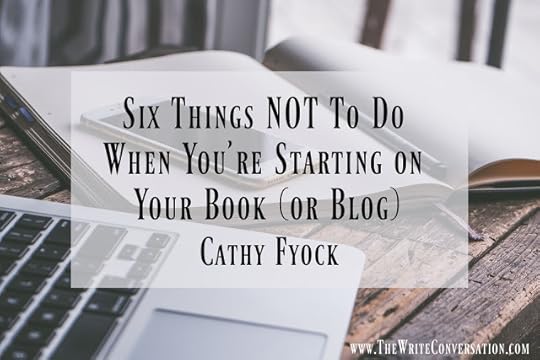
by Cathy Fyock @CathyFyock
Why is it so hard to start a big project? Maybe it’s because it is so big that it seems daunting, or that it’s difficult to identify the best first step.
Starting your book can offer the same challenges: how do you get started in a productive and confident manner?Here are six ideas about what NOT to do when tackling that first draft.
1. Read every other book on the topic before you start. While it is important to know your topic and have solid research behind you, and it’s important to complete an analysis on other books on your subject, it may be counterproductive to peruse all the competitive literature on your topic. Assuming you know your topic, what your book should offer is a fresh approach, a new perspective, and a novel take on the subject matter. If you spend too much time in analyzing what others have said, you may be less likely to boldly state your unique stance. Do your homework, but don’t be so compulsive about research that you fail to begin or lose your fresh perspective.
2. Just start writing. Writing without a road map is as productive as starting out on a vacation without any decision about where you’re going or what you want to accomplish. Every book project should begin with a thorough understanding of the purpose for your book as well as a clearly defined thesis statement. If you haven’t decided how you will use your book (as a calling card, as your curriculum for workshops, as a leave-behind after presentations to help with the call to action), you may write the wrong book. And, without a thesis statement, you’re writing about a topic, not focusing in on a perspective that is valued by your reader.
3. Start with a blank page. Blank pages are hard. Most every author will agree. So don’t start there. Begin with your content outline, and begin fleshing it out. Then start jotting down content that you want to include: quotes, data, stories, examples, cases. Then go through and make notes of other writing you will repurpose for this book. Now, begin to write! See how much easier it is.
4. Start with chapter one. Chapter one is usually the hardest chapter to write, since it introduce the reader to everything you’ll be saying in the book. Write the easiest chapter first, then the next easiest, then the next. Write the first and last chapters after all the other chapters are written, setting the stage and summarizing the action.
5. Clean your office. Rearrange your desk. Find the perfect notebook. Rearrange your sock drawer. Productive procrastination is a tough habit to break, since you are so darned productive while you’re doing it. The only problem is that it is getting in the way of you accomplishing what is most important—your work on this project. So let the office get a little dusty, and let the paper stacks grow in piles around your desk. It’s time to focus on the one thing you want most to accomplish—the writing of your book!
6. Edit as you go. Make everything perfect and keep going back to clean it up before getting it all sketched out. If you want to get this book written, stop editing and just write. Stopping to edit every few pages is akin to starting off on a trip wanting to keep the fuel tank on F. You will certainly have a full gas tank, but it’s going to take you a long time to reach your destination. And in addition, brain science tells us that writing and editing are two distinct brain functions, and editing while writing is multi-tasking—a feat which is daunting at best. Just focus on writing, and once you’ve got the bones in place, then begin to edit and tweak.
Starting a book can be a huge task, but can be made much easier when you avoid these major pitfalls!
TWEETABLE
Six Things NOT To Do When You’re Starting on Your Book (or Blog) - @CathyFyock on @EdieMelson (Click to Tweet)
 Cathy Fyock is The Business Book Strategist, and works with professionals and thought leaders who want to write a book as a business development strategy. Since starting her business as a book coach in 2014, she has helped more than 160 professionals become published authors. Her most recent book is The Speaker Author: Sell More Books and Book More Speeches. She can be reached at cathy@cathyfyock.com or 502-445-6539.
Cathy Fyock is The Business Book Strategist, and works with professionals and thought leaders who want to write a book as a business development strategy. Since starting her business as a book coach in 2014, she has helped more than 160 professionals become published authors. Her most recent book is The Speaker Author: Sell More Books and Book More Speeches. She can be reached at cathy@cathyfyock.com or 502-445-6539.
Published on April 24, 2020 22:00
April 23, 2020
5 Reasons You Should Host a Facebook Live Book Launch Party – Pandemic or Not
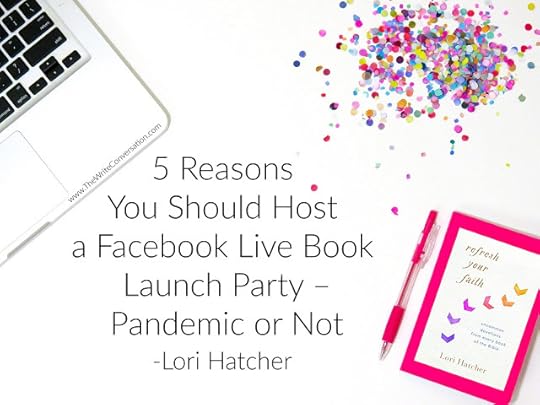
by Lori Hatcher @LoriHatcher2
There’s nothing like launching a book in the midst of a pandemic.
I empathized with Lauren Crews as she shared in her Write Conversation post last week how all her book launch plans changed when President Trump advised Americans to stay at home. The same thing happened to me.My devotional, Refresh Your Faith, Uncommon Devotions from Every Book of the Bible , was scheduled to launch on April 13, Day 27 of our nation’s shelter-at-home order.
My plans for an in-person launch party with food, decorations, giveaways, and lots and lots of friends were washed away by a wave of hand sanitizer and social distancing.
What’s an author to do?
I knew Refresh Your Faith would be a valuable resource for the millions of people stuck at home with nothing to dwell on but their fears. My book could inspire their courage and help answer the faith questions they were wrestling with, like Why does God allow bad things to happen?, Will God provide for me?, and What is God doing in this crazy mixed up world?
Two things were clear. First, I couldn’t just wait to launch the book until the stay-at-home orders lifted. God intended this book “for such a time as this” (Esther 4:14).
Second, because God is sovereign over all the events of our lives, He was not surprised in the least by this ill-timed pandemic that was disrupting my plans. He had other (better?) plans for my book launch.
So I postponed my plans for an in-person party and scheduled a Facebook Live launch party. Looking back, if I had it to do over again, with or without a pandemic, I’d still include a Facebook Live event in my book launch plans.
Five Reasons to Throw a Facebook Live Launch Party
1. Facebook Live events are easy for people to attend.Unlike an in-person launch party, guests don’t have to drive somewhere, dress up, or find a place to park. They can attend from the comfort of their own living room and wear their pajamas if they want to.
2. Facebook Live events are relatively inexpensive.Like in-person parties, you’ll want to provide door prizes and giveaways, but you don’t have to rent a venue, buy elaborate decorations, or provide food.
3. Facebook Live events reach people who couldn’t or wouldn’t come to an in-person launch.My friend Sandy, a missionary in Guadalajara, Mexico, couldn’t have attended my in-person launch party in Columbia, South Carolina, but she was one of the first people to register her attendance at my FB event. So was Jeanne from Connecticut, J.D. from Texas, and Holly from Louisiana. Over the course of the hour-long party, more than 70 friends “attended” the event, probably more than would come to an in-person party.
4. Facebook Live events require no special equipment.All you need is a laptop with a camera and a microphone (ideal) or a smartphone (doable). A long event like a launch party is hard to do with a phone unless you have a tripod. Even then, it’s hard to read comments, but if a smartphone is all you have, go for it.
Because I knew proper lighting can make or break a video, I invested $40 and bought a Selfie Ring Light Kit from Amazon. It came with a four-setting ring light, a tripod that holds a camera or a smartphone, and a remote I can sync with my phone to stop and start recording. Although I didn’t know it at the time, this equipment has been useful to our church as we’ve begun to live stream our church services.
5. Facebook Live events are FUN.I posed conversation-sparking questions to get the party going. I gave away gift cards, signed copies of Refresh Your Faith , and other items that could be easily mailed. We shared struggles, swapped ideas for how to refresh our faith during dry times, and exchanged laughs in the comment box. I even read an uncommon devotion on Jonah to invite readers to share their own examples of “mercy in disguise.”
Next month I plan to share tips and techniques for hosting a successful Facebook Live book launch party. While a virtual party wasn’t part of my original plan, it turned out to be a valuable tool to help me connect with readers and spread the word about my book. If you’re preparing to launch a book—d ring this pandemic or after—I encourage you to consider hosting a Facebook Live launch party. And please, invite me!
TWEETABLE5 Reasons You Should Host a Facebook Live Book Launch Party – Pandemic or Not - @LoriHatcher2 on @EdieMelson (Click to Tweet)
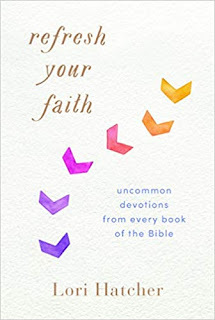 About
Refresh Your Faith, Uncommon Devotions from Every Book of the Bible
About
Refresh Your Faith, Uncommon Devotions from Every Book of the Bible
That's in the Bible? I've never noticed that before!
It's probably been too long since you've newly discovered a story that speaks to your soul or a verse that pops with truth. But that's about to change!
Refresh Your Faith contains 66 culturally relevant, story-driven devotions, one from each book of the Bible. Each real-life story spotlights an unusual verse or Bible passage that you may have overlooked in your usual Bible reading. Lori Hatcher challenges you with additional features like an uncommon thought to ponder; an unusual faith action step; and an unfamiliar passage suggestion for additional Bible reading.
When the fabulous has become familiar and your quiet times are more like nap times, it's time to step out of spiritual boredom and ignite the spark that will keep you growing. No matter where you are on your faith journey, Lori's conversational and engaging style will challenge you to think about things you've never thought about before.
“Real-life inspiration and candid wit. These 5-minute devotions will change your life.” —Psychologist and best-selling author Dr. Kevin Leman, commenting on Lori Hatcher's devotional style
 Lori Hatcher loves to teach, train, and encourage writers by sharing what others have generously shared with her. She’s the author of several devotional books including
Refresh Your Faith – Uncommon Devotions from Every Book of the Bible
and
Hungry for God … Starving for Time, Five-Minute Devotions for Busy Women
, the 2016 Christian Small Publisher Book of the Year. The editor of
Reach Out, Columbia
magazine, she’s also a blogger, writing instructor, and inspirational speaker. You’ll find her pondering the marvelous and the mundane on her blog, Hungry for God. . . Starving for Time . Connect with her on Facebook, Twitter (@LoriHatcher2), or Pinterest (Hungry for God).
Lori Hatcher loves to teach, train, and encourage writers by sharing what others have generously shared with her. She’s the author of several devotional books including
Refresh Your Faith – Uncommon Devotions from Every Book of the Bible
and
Hungry for God … Starving for Time, Five-Minute Devotions for Busy Women
, the 2016 Christian Small Publisher Book of the Year. The editor of
Reach Out, Columbia
magazine, she’s also a blogger, writing instructor, and inspirational speaker. You’ll find her pondering the marvelous and the mundane on her blog, Hungry for God. . . Starving for Time . Connect with her on Facebook, Twitter (@LoriHatcher2), or Pinterest (Hungry for God).
Published on April 23, 2020 22:00
April 22, 2020
What Inspires Me as a Writer?

by Henry McLaughlin @RiverBendSagas
Like many writers, I’m frequently asked what inspires me to write. Often, this goes far beyond the specific book they’ve been reading.
Some authors might respond, “I need to earn a living.” Although few writers actually support themselves with their writing. So what inspires them to get up every day and sit with computer or pen and paper to gather words that will tell stories?What inspires the plumber, the carpenter, the lawyer, the teacher, the mechanic, the nurse, the pastor to go to work every day?
Earning a living is part of it to be sure. But I think there is something else motivating them. And they may not even know it. I think the drive is to serve; to share the expertise and talents God has given us to help others on their life journey. They may not see it this way. They may be as far from God as the Moon is from Earth. He is still able to use them.
What inspires us? A grammatically-challenged yet clichéd answer many authors give is: “I can’t not write.” Well, that’s not always true for everybody.
I’m a writer, but there have been occasions when I’ve stopped writing for a period of time, which turned into lengthy spans of weeks and months.
There are also times when I want to quit writing all together. At those moments, God will send someone across my path, frequently my wife, who will kick my butt and tell me to get over myself and do what God’s called me to do. Which is to write with a specific purpose.
The themes of restoration and redemption and reconciliation flavor my novels and short stories. The Lord has led me to explore these concepts through fiction. I strive for my stories and novels to contain real truth about who we are, what we strive for, how we struggle to get there.
My goal is for my characters and the experiences they go through to provide hope to the reader. My characters are flawed, just like real people. My characters face challenges and obstacles that are as overwhelming as the ones we face every day. Yet they find a way through them.
Many of my characters are still flawed at the end of the book. But along the way they’ve experienced redemption, their lives have been restored, they’ve reconciled past hurts. They’ve been healed emotionally and spiritually. They’ve made steps toward forgiveness. Not completely, but they are on their way. Which is my tag line Continue the Journey is so important to me.
God inspires me to write to offer encouragement to my readers, to show hope even in the most dire situations, to help the reader see the way ahead and to take the first steps on the path God has for them.
What inspires you to do your job every day?
TWEETABLE
What Inspires Me as a Writer? - Henry McLaughlin, @RiverBendSagas, on @EdieMelson (Click to Tweet)
 Henry’s debut novel, Journey to Riverbend, won the 2009 Operation First Novel contest.
Henry’s debut novel, Journey to Riverbend, won the 2009 Operation First Novel contest.Henry edits novels, leads critique groups, and teaches at conferences and workshops. He enjoys mentoring and coaching individual writers.
Connect with Henry on his blog, Twitter and Facebook.
Published on April 22, 2020 22:00
April 21, 2020
Tips to Find the Perfect Topics to Blog About

By DiAnn Mills @DiAnnMills
Recently, I found myself in a dilemma. I failed to find a blog post topic that interested me. The worrying got me nowhere until I remembered the post shouldn’t be about me, but my readers. A sprinkling of creativity took over, and the result was a goldmine of topics—straight from my readers. Within a few days, I had 52 unique blog post topics. Now I’m set for the next year!
Create a blog post that asks the reader for help.
For example:
Friends, I’m in a dilemma, and I need your help. My blog is designed to meet your needs. Because you are important to me, I want to ensure you receive the topics that interest you.
When your inbox says there’s a post from (fill in your name).What topics do you hope to read?What topics are not your favorite?What topics thrill you?
For all of you who give me ideas in the comments below, I’ll enter your name in a random drawing giveaway where a lucky person will receive a choice of an Amazon e-gift card, a Barnes & Noble e-gift card, a Starbucks e-gift card or (you choose the type of gift card) valued at (fill in the amount) USD. Deadline is (Day), (Date), (Time) (Time Zone). The first name and state or country of the winner will be announced in next week’s blog post.
Are you willing to help me choose blog post topics of most interest to you?
The above post reminded me the value of reaching out to my audience for what they wanted to read from me. We all have gifts, strengths, and values to share with others.
Our readers long for:Answers only we can provideEntertainmentInformationInsights into our expertiseSneak peeks into our personal lives.
How can you focus your blog posts to draw in readers?
TWEETABLETips to Find the Perfect Topics to Blog About - @DiAnnMills on @EdieMelson (Click to Tweet)
 DiAnn Mills is a bestselling author who believes her readers should expect an adventure. She creates action-packed, suspense-filled novels to thrill readers. Her titles have appeared on the CBA and ECPA bestseller lists; won two Christy Awards; and been finalists for the RITA, Daphne Du Maurier, Inspirational Readers’ Choice, and Carol award contests.
DiAnn Mills is a bestselling author who believes her readers should expect an adventure. She creates action-packed, suspense-filled novels to thrill readers. Her titles have appeared on the CBA and ECPA bestseller lists; won two Christy Awards; and been finalists for the RITA, Daphne Du Maurier, Inspirational Readers’ Choice, and Carol award contests. She is the director of the Blue Ridge Mountain Christian Writers Conference, Mountainside Marketing Retreat, and Mountainside Novelist Retreat with social media specialist Edie Melson. Connect here: DiAnnMills.com
Published on April 21, 2020 22:00
April 20, 2020
It’s Okay for Writers to Lament

by Lucinda Secrest McDowell @LucindaSMcDowel
For me, today marks 40 days of quarantine—not leaving my home at all except to walk in my empty neighborhood, wearing a mask of course. This Coronavirus Pandemic has upended our world and we are all adjusting to a whole new way of life.
Well, for many of us, it means that new books are launching out into a world with no book tours, speaking engagements, and radically reduced publicity. Shipping of product and online shopping have even been affected so that your book may not be available at this time. That wonderful launch party or conference you planned so long ago with such excitement? Cancelled. All those speaking events are now either postponed or cancelled since large gatherings are banned indefinitely.
For others in the middle of writing, pitching, editing, and exploring, there are many contacts in the industry who are currently furloughed, or just don’t know how to make promises on future projects. And yes, there are some who are still signing new contracts—yay!
While we may have joked about needing to be chained to our desk in order to get work done, being stuck at home isn’t a panacea. The current situation is often so fraught with emotions, financial concerns, and family matters like homeschooling that many of us simply are not writing at all. Of course, some may be especially inspired and full of productivity.
Regardless of where you are in all this, I suspect there is some deep grief that your 2020 has not turned out to be what you hoped and planned. Writers conferences have been cancelled or moved online. Perhaps one of the best perks of gathering at such events is the face-to-face with other writers and people who understand. Needless to say, those relationships have had to be fed and nurtured in other ways. Writing is a lonely profession to begin with, but now even more so.
Friend, I believe with all my heart that we will get through this and God will continue to use us (and yes, even all our books that come out during this season). But right now, I also want to tell you that it’s okay to be disappointed and to grieve whatever losses you are experiencing.
I refuse to live in fear. But I do cry—for friends and family who have already died from this virus; and for dreams and hopes that must be recalibrated now.
God—the One who created us and loves us all—knows all about lament. Another writer—King David—often wrote down his lament.
O Lord, how long will you forget me? Forever? How long will you look the other way? How long must I struggle with anguish in my soul, with sorrow in my heart every day? How long will my enemy have the upper hand? Turn and answer me, O Lord my God! Restore the sparkle to my eyes, or I will die. Don’t let my enemies gloat, saying, “We have defeated him!” Don’t let them rejoice at my downfall. But I trust in your unfailing love. I will rejoice because you have rescued me. I will sing to the Lord because he is good to me. (Psalm 13)
How long, O Lord? …Unless the Lord had helped me, I would soon have settled in the silence of the grave. I cried out, “I am slipping!” but your unfailing love, O Lord, supported me. When doubts filled my mind, your comfort gave me renewed hope and cheer. …But the Lord is my fortress; my God is the mighty rock where I hide. (portions of Psalm 94)
Can you relate to King David’s words? What do we do with pain and discouragement?
I don’t have all the answers. But I know where to turn.
To God. In lament. In lament, a petitioner addresses God on some occasion of calamity. Since we are writers, it seems logical and healthy to process our pandemic lives through writing.
If you (like me) are feeling helpless (or even hopeless), may I suggest you join me by reading one of the Psalms of Lament in the Bible and using the same elements, write.
Writing Your Own Prayer of LamentBe still and enter God's presence. Invite Him to sit with you in your sorrow and confusion. This is usually best done in silence.Write through the painful or evil situation that happened which is causing such grief and loss. Articulate your feelings as you think of the suffering, deprivation and hopelessness.Wait and allow God to speak into your heart and soul as you continue to intercede in prayer for the people, places and circumstances of this situation.Identify with those involved and call out to God in honesty. Yes, lament. Articulate your complaint and confusion and even anger to God. He can take it.Know that our God is a God of compassion. Take time to confess your trust in God's power and provision - in His sovereignty. Use your own words.Listen for God's word of assurance to you. And then write those words to yourself and perhaps share them with your community so desperate for answers. Sometimes the greatest answer is God saying "I am here." Conclude with an offering to God that you will praise Him for who He is - and that you know the end of the story is His ultimate victory.Sometimes this is all we can do when our world turns upside down and the future is unclear. But it’s a beginning.
Cry out to God. He will answer.
TWEETABLEIt’s Okay for Writers to Lament - encouragement from @LucindaSMcDowel on @EdieMelson (Click to Tweet)
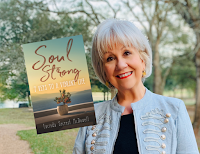 Lucinda Secrest McDowell, M.T.S., is a storyteller and seasoned mentor who engages both heart and mind while
“Helping you Choose a Life of Serenity & Strength.”
A graduate of Gordon-Conwell Theological Seminary and Furman University, McDowell is the author of 15 books and contributing author to 30+ books. Her award-winning books include
LIFE-GIVING CHOICES
,
SOUL STRONG
(2020),
DWELLING PLACES
(2017 Christian Retailing BEST Award for Devotional),
ORDINARY GRACES
(2018 Selah Finalist),
LIVE THESE WORDS
, and
Refresh!
Lucinda, a member of the REDBUD WRITERS GUILD, received Mt. Hermon “Writer of the Year” award and guest blogs for The Write Conversation, Blue Ridge Mountains Christian Writers Conference Blog and (in)courage. Whether co-directing
“RENEW ~ RETREAT FOR NEW ENGLAND WRITING,”
pouring into young mamas, or leading a restorative day of prayer, she is energized by investing in people of all ages. Lucinda’s favorites include tea parties, good books, laughing friends, ancient prayers, country music, cozy quilts, musical theatre, and especially her family scattered around the world doing amazing things. Known for her ability to convey deep truth in practical and winsome ways, she writes from “Sunnyside” cottage in New England and blogs weekly at
https://lucindasecrestmcdowell.com/
Follow Lucinda on Twitter: @LUCINDASMCDOWEL
Lucinda Secrest McDowell, M.T.S., is a storyteller and seasoned mentor who engages both heart and mind while
“Helping you Choose a Life of Serenity & Strength.”
A graduate of Gordon-Conwell Theological Seminary and Furman University, McDowell is the author of 15 books and contributing author to 30+ books. Her award-winning books include
LIFE-GIVING CHOICES
,
SOUL STRONG
(2020),
DWELLING PLACES
(2017 Christian Retailing BEST Award for Devotional),
ORDINARY GRACES
(2018 Selah Finalist),
LIVE THESE WORDS
, and
Refresh!
Lucinda, a member of the REDBUD WRITERS GUILD, received Mt. Hermon “Writer of the Year” award and guest blogs for The Write Conversation, Blue Ridge Mountains Christian Writers Conference Blog and (in)courage. Whether co-directing
“RENEW ~ RETREAT FOR NEW ENGLAND WRITING,”
pouring into young mamas, or leading a restorative day of prayer, she is energized by investing in people of all ages. Lucinda’s favorites include tea parties, good books, laughing friends, ancient prayers, country music, cozy quilts, musical theatre, and especially her family scattered around the world doing amazing things. Known for her ability to convey deep truth in practical and winsome ways, she writes from “Sunnyside” cottage in New England and blogs weekly at
https://lucindasecrestmcdowell.com/
Follow Lucinda on Twitter: @LUCINDASMCDOWEL
Published on April 20, 2020 22:00
April 19, 2020
A List of Little Things In Marketing Every Author Needs to Consider

by Karen whiting @KarenHWhitingAddress labels add a photo of your bookAdd author to your checksAdd a card or sticker inside your book inviting readers to review your book, join your newsletter, and follow you on social mediaTWEETABLEA List of Little Things In Marketing Every Author Needs to Consider - @KarenHWhiting on @EdieMelson (Click to Tweet)
 Karen Whiting (www.karenwhiting.com) is an international speaker, former television host of Puppets on Parade, certified writing and marketing coach, and award-winning author of twenty-six books for women, children, and families. Her newest book, 52 Weekly Devotions for Families Called to Serve, uses stories, activities, and chat prompts to help families develop servant hearts and foster strong bonds in families who have members serving the community, nation, or world.
Karen Whiting (www.karenwhiting.com) is an international speaker, former television host of Puppets on Parade, certified writing and marketing coach, and award-winning author of twenty-six books for women, children, and families. Her newest book, 52 Weekly Devotions for Families Called to Serve, uses stories, activities, and chat prompts to help families develop servant hearts and foster strong bonds in families who have members serving the community, nation, or world.She has a heart to grow tomorrow’s wholesome families today. She has written more than seven hundred articles for more than sixty publications and loves to let creativity splash over the pages of what she writes. She writes for Leading Hearts and Crosswalk.com. Connect with Karen on Twitter @KarenHWhiting, Pinterest KarenWhiting, and FB KarenHWhiting
Published on April 19, 2020 22:00
April 18, 2020
Stuck at Home—What's a Writer To Do?

by Tammy Karasek @TickledPinkTam
We could agree that most of the country if not the world has been given the orders to stay home. As writers, at least to this one, my first thought was no problem. I’m a writer and I stay home all the time to write. No big deal.
Until it was. The old cliché and song, you don’t know what you’ve got ‘til it's gone, really hits home right about now. I seriously thought I stayed home a lot. Seems I didn’t.
I miss my monthly writing group meeting where I
But this serious virus storming the world won’t keep us writers from meeting. Nope, we have been given tools that allow us to gather. And more than six feet apart, too.
There have been Facebook lives with great teachings. Zoom meetings set up so we can look at the screen, sometimes Brady Bunch style, and see their pretty faces—or handsome ones. We laughed at whether we should stand up and see who actually is dressed as nicely as they are from the waist up. But then the protests of a few answered that question for us! Ha, we know who’s wearing yoga pants with their fancy top. MmmHmm, we know.
During this time of keeping apart, take advantage of a more empty schedule. Organize your office or writing space. Clear out files and table tops of old papers not needed any longer or that have changed in the industry. Please tell me it’s not just me that keeps it all. Every. Handout.Go ahead and finally shred that pile of papers waiting to be shredded.Oh, here’s one probably for all of us … clean out the email inbox. Info I saved in an email from 2014 about how to do something on social media is probably okay to delete. Look through your Documents area on your computer, are there any documents saved that need to be added to a folder? Or, should you start a folder to gather similar information into one spot?Take the time to organize photos you’ve taken to use for memes so you can actually find them when ready to create a new meme for your social media. Take a journal or notebook and find a comfy spot in the sun. Brainstorm your next article, blog post or book. You have time, why not do a couple of them. Pull out note cards or stationery and a pen to write a friend or two in the lost art of letter writing. I’ve had fun with my Christmas presents of new fountain pens – and of course, pink ink!
Whatever you choose to do during this more quiet time at home, set yourself up for success for the future of your writing. This is a perfect time to attack those little round to its that we often don’t get to. I’m a list maker and have been working down my list the last week or two. Some days I cross off five items and add three, but I still feel good that I’ve accomplished something. Having a more organized space will help you as you continue in your writing.
I’ve shared a few things that have happened in my writing world during this current situation, so please share with us what things you are doing to keep yourself occupied during this stay at home season of our life.
TWEETABLEStuck at Home—What's a Writer To Do? @TickledPinkTam on @EdieMelson (Click to Tweet)
 You’ll find Tammy seeing humor and causing laughter in every aspect of life. Her past, filled with bullying and criticism from family, is the driving force of her passion to always encourage others and give them The Reason to smile. She’s been married to her college sweetheart, Larry, for 37 years, a mom to their grown daughter, Kristen, and wrapped around the paw of a little dog named Hattie. Born and raised in Ohio, her family now resides in South Carolina. She is the President of Word Weavers Upstate SC, member of ACFW and My Book Therapy/Novel Academy. She’s the Blog Editor for Word Weavers International. A Conference Assistant for Blue Ridge Christian Writers Conference. A monthly contributor for The Write Conversation. A contributor in the 2018 Divine Moments Compilation Book—Cool-inary Moments. Also a regular contributor to several other blogs.
You’ll find Tammy seeing humor and causing laughter in every aspect of life. Her past, filled with bullying and criticism from family, is the driving force of her passion to always encourage others and give them The Reason to smile. She’s been married to her college sweetheart, Larry, for 37 years, a mom to their grown daughter, Kristen, and wrapped around the paw of a little dog named Hattie. Born and raised in Ohio, her family now resides in South Carolina. She is the President of Word Weavers Upstate SC, member of ACFW and My Book Therapy/Novel Academy. She’s the Blog Editor for Word Weavers International. A Conference Assistant for Blue Ridge Christian Writers Conference. A monthly contributor for The Write Conversation. A contributor in the 2018 Divine Moments Compilation Book—Cool-inary Moments. Also a regular contributor to several other blogs. Connect with Tammy: Blog: http://www.tammykarasek.com Email: tickledpinktammy@gmail.com
Published on April 18, 2020 22:00



